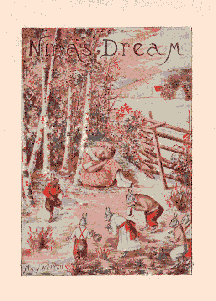Nina's Dream
by Mary Waddell
One day Nina ran across the field, crawled through -an' old rail fence, and had a great time playing in the border of the forest. After a while she felt tired and sat down by a little tree near the fence. Just then a rabbit hopped by and disappeared through the underbrush. Resting her head on her knees, -Nina sang- softly to herself:
'The raccoon had a busy tail,
The possum's tall was bare,
The rabbit didn't have any tail at all
Just a little bunch of hair,
Just a little-bunch-of-'
Suddenly Mr. and Mrs. Rabbit, and Jack and Bunny Rabbit and several of their friends appeared before her.-Mr. Rabbit too off his hat and bowed, and Mrs. Rabbit bowed also. Bunny's curiosity-led him nearer than the others, but be was ready for flight at any moment. They all looked so funny that Nina laughed.
"Why how do you do, Mr. Rabbit, and Mrs. Rabbit, and Jack and Bunny all the rest," she said. "I am very glad to see you I am sure; but pray tell me why I am ho honored by this visit?"
Mr. Rabbit bowed again and said: "We chanced to be passing by on the other side of the fence when we heard you singing about our tails. Jack and Bunny urged us to stop and explain to you how we happen to have 'just a little bunch of hair' instead of a bushy tail like the racoon, or a long slick cl-one like the 'possum."
"Indeed, I shall be very glad to know. I have often wonder about it-but won't you all sit down while you talk?
"Oh,-no, thank you," replied Mrs. Rabbit. "I'm afraid we'd muss our clothes. The grass is getting damp and-Jack! Ho many times must I tell you to stop that sniffing! You should break yourself of such a bad habit."
"Well," said Mr. Rabbit, as he took a bite from a cabbage leaf he carried in his pocket, "it was many, many years ago that all rabbits had longer tails than the 'possum, and a more bushy one than the racoon. One of my ancestors met with very serious and painful accident one day. He- was hopping along through the fields when his long bushy tail collected s many burs from the plants growing there, that it became very heavy and cumbersome, indeed. He was just trying to thin of some plan to get rid of the burs when all at once a fierce dog came bouncing toward him. My noble ancestor ran as fast he could; but what chance for escape had he with that heavy tail dragging along behind him? the dog kept getting closer and closer till at last it grabbed the tail at no great distance from the body. The rabbit, however, did not wait. It was very painful of course; but when he looked back and saw the do with a part of the tail in his mouth and the rest stuck tight to the fur on his face, he just hopped for joy. The weight being gone he was able to escape with ease.
"When all the other rabbits found how fast my ancestors could travel, they were filled with envy. They began at on to hold conventions to discuss ways by which they might r move their tails."
"Why couldn't they get the dog to bite theirs off, too asked Nina.
"My dear girl," said Mrs. Rabbit, while Jack and Bunny snickered, "such a thing- was impossible. That dog choked to death on the burs, and all other dogs refused to attempt it. they could not get beyond the tail, they gave up the chase."
"Go on," urged Bunny. "Tell her what they did next." "Well," continued Mr. Rabbit, "they tried all kinds of thing One fellow left his tail sticking out in the cold at night, hoping it would freeze off; but it only fluffed the more when war weather came. I cannot tell you all the things they did, b some got all the hair off, and others made theirs sore. At last however, one wise rabbit thought of soaking his in a jar of whisky."
"What did that do?" asked Nina.
"Why, the whisky burnt up all that could be kept in the vessel. just a little next to the body was left. That is why the little bunch of hair is still there!"
"Did you all fix your tails that way?"
"O, no indeed! That was a long, long time ago; but it became the style and was done so much that after a while all rabbits ceased to have tails. It was a good thing any way for-"
"O my! Where am I? Oh! My neck hurts. I think I've been asleep." jumping up, Nina ran home as fast as she could to tell her mother about her strange dream. "Why do you suppose I dreamed about burning tails off with whisky, Mother?" she asked.
"Perhaps it was because I had been reading to you about the effects of alcohol on the body."
"O,I remember now. Our bodies are made of little bits of things called cells. Every time any one drinks whisky, the alcohol in it burns some of them up and they stay burned always."
"Yes; and the more cells there are destroyed, the weaker the body becomes. It is very easy then to take some disease. In your dream, only that part of the rabbit's tail that was covered with whisky was burned; but alcohol on the inside goes through all parts of the body."
"Mother, why don't our country make people quit drinking?"
"There is a law against it, Nina; but the law will do no good unless people are compelled to obey it."
"If I learn to respect and obey you, it will be easier to obey the laws of the country, won't it, Mother?
"Yes, dear. To be a good child or citizen is a great thing. I hope-Nina, what are you laughing at?"
"I beg your pardon, Mother, I was listening to you, but I just happened to think about how funny the rabbits looked.
---
Published by the Lincoln-Lee Legion, Westerville Ohio
Copyright, 1922. The American Issue Publishing Co.
A hard copy of this story can be found in the Anti-Saloon League Collection at the Westerville History Museum.
About the League
Museum Hours
Monday-Saturday: 9am-6pm
Closed on Saturday: 1-2pm
Closed on Sunday









